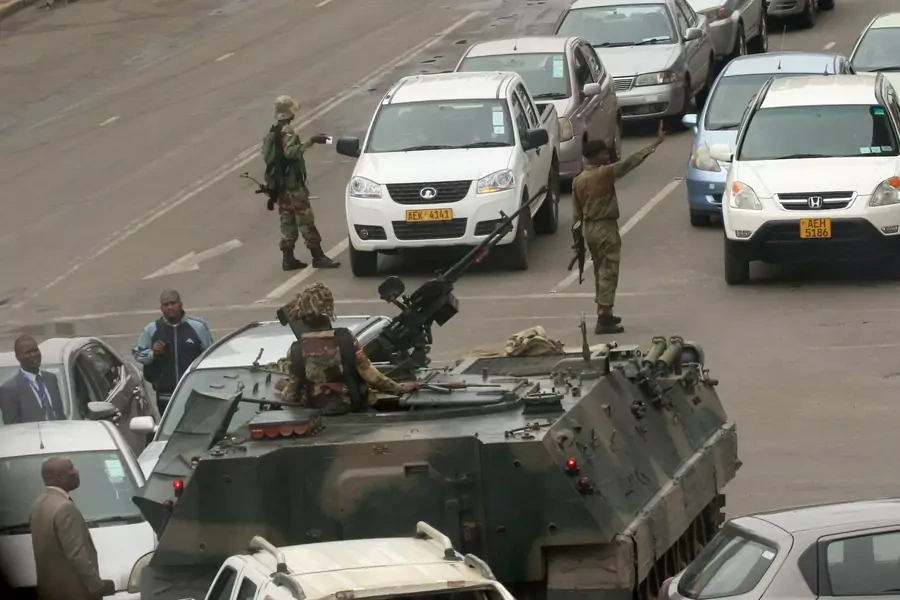Military Coup in Zimbabwe Remains Bloodless

As of today, the military seems to be firmly in control of Zimbabwe’s capital, Harare, after what appears to have been a military coup. Tanks and armored vehicles have been deployed and the streets are relatively empty, though banks and shops remain open. Thus far, no elements within the military have rallied to Mugabe and his wife, Grace, who are under house arrest at their private residence, though there are growing reports of gunfire around the city. Were some army units to rally to Mugabe, the likelihood of violence would greatly increase. The ZANU-PF youth league has already pledged it is “prepared to die” for him. South Africa’s president Jacob Zuma has been in contact with Mugabe, who said that he and his wife are fine.
Within the military, it is unclear who is in charge. It has made no announcement that Mugabe has been deposed from the presidency, it has publicly guaranteed the independence of the judiciary, and Harare newspapers continue to publish. Despite professions by military spokesmen to the contrary, this is, indeed, a coup. The military has seized the state television station, and while it is treating the Mugabes well, the president and his wife are its prisoners. The finance minister, Ignatius Chombo and the head of the ZANU-PF youth league have also been arrested, according to South African media. There is speculation, which is credible, that deposed vice president Emmerson Mnangagwa is behind the coup, and it would come as no surprise to many were he to assume control of the government. Mugabe’s removal of Mnangagwa to make way for Grace to succeed him likely precipitated the military’s move. Mnangagwa’s present whereabouts are unknown, but it is widely assumed that he is in South Africa. If Mnangagwa does take charge, he is likely to retain Mugabe as a figure-head. The fate of his wife and her supporters, called the G-40, however, is more problematic, as she clearly wants the presidency for herself. Neither Grace nor Mnangagwa are popular, but the latter at least has the military on his side.
More on:
Further to that point, the coup is not a popular uprising. Rather, it is a “palace coup” within the governing ZANU-PF political party motivated by a struggle between two factions. The issue between the two is not one of policy but of who gets to cut the “national cake” (i.e. distribute state largesse) following Mugabe’s incapacity or death. Vice President Mnangagwa’s removal was a clear sign that the president had opted for his wife to succeed him. The perpetrators, apparently close to the ex-vice president within the ZANU-PF, include those who led the overthrow of white minority rule in 1980 during the liberation “struggle.” The G-40, the rival faction within the ZANU-PF, is led by Grace. It is of a younger generation that did not participate in the “struggle.” Further, Grace’s G-40 coalition is primarily civilian, while the older generation has strong ties to, and is made up of, the military. For now, Grace and her supporters seem to have been defeated.
The coup-makers justify their action as a move to displace the “criminals around Mugabe,” but not to remake the current political and economic system, which has resulted in widespread poverty and economic chaos. There are no “white hats” within ZANU-PF; there is no evidence that Grace Mugabe and the G-40 would be any less rapacious and self-serving than the generation of “freedom fighters” they sought to displace.
It is too early to say what the popular reaction to the military move will be, if there is one at all. Mugabe and the ZANU-PF have successfully emasculated the official opposition associated with Morgan Tsvangirai and it is prone to division. Most viable to affect change is a street protest movement associated with Christian religious leaders that has used national symbols such as the flag to try to rally the nation against the regime’s human rights abuses and bad governance. While it looks to radical change, its goals and methods are not yet clearly defined. Aspects of it recall the early days of the “Arab Spring.” Mugabe’s response has been to arrest and jail the movement’s leaders and it is unlikely that the military will respond any differently. Nevertheless, the fact that there has been a coup, and that Mugabe has, in effect, been deposed, may open the range of possibilities for popular opposition.
Many Africans like to say that the era of coups is past, but Zimbabwe is currently facing one. Mugabe is an icon of African liberation across the continent. For many, he drove the whites out and distributed the land to Africans. (The reality is much more self-serving for Mugabe and his cronies, who personally benefitted from the land seizures.) Thus far, the African Union has made no public comment, though it is on record strongly opposing military coups. There have been statements from Nigeria’s President Muhammadu Buhari, South Africa’s Jacob Zuma, and UK Foreign Minister Boris Johnson. They in one form or another call for restraint and avoidance of violence. China, Zimbabwe’s largest trading partner, has merely indicated that it is monitoring the situation. The strongest response has been from President Zuma of South Africa, who has said he will send a delegation to Harare and involve the Southern Africa Development Community, the regional security and economic organization. What these interventions can actually accomplish remains unclear.
More on:
 Online Store
Online Store